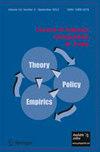在非洲银行业检验平静生活假说
IF 0.6
Q4 BUSINESS
引用次数: 19
摘要
平静生活假说(QLH)是企业追求低效率的理论。在这项研究中,我们评估了非洲银行业中强大的银行是否正在增加融资渠道。因此,QLH与大型银行追求金融中介效率低下是一致的。为了研究这一假设,我们首先估计了勒纳指数。然后,使用两阶段最小二乘法,我们评估了勒纳指数对贷款价格和贷款数量所代表的金融准入的影响。实证证据基于2001-2001年期间来自42个国家的162家银行组成的小组。研究结果支持QLH,尽管平静的生活是由低于中位数的勒纳指数子样本驱动的。讨论了政策影响。本文章由计算机程序翻译,如有差异,请以英文原文为准。
Testing the Quiet Life Hypothesis in the African Banking Industry
The Quiet Life Hypothesis (QLH) is the pursuit of less efficiency by firms. In this study, we assess if powerful banks in the African banking industry are increasing financial access. The QLH is therefore consistent with the pursuit of financial intermediation inefficiency by large banks. To investigate the hypothesis, we first estimate the Lerner index. Then, using Two Stage Least Squares, we assess the effect of the Lerner index on financial access proxied by loan price and loan quantity. The empirical evidence is based on a panel of 162 banks from 42 countries for the period 2001–2011. The findings support the QLH, although quiet life is driven by the below-median Lerner index sub-sample. Policy implications are discussed.
求助全文
通过发布文献求助,成功后即可免费获取论文全文。
去求助
来源期刊

Journal of Industry Competition & Trade
BUSINESS-
CiteScore
3.10
自引率
5.30%
发文量
15
期刊介绍:
The Journal of Industry, Competition and Trade (JICT) publishes research on the microeconomic foundations of industrial strategy, innovation, competition, and trade policy, concentrating on the functioning of markets for goods and services. The journal’s primary aim is to bridge the gaps between economic theory, empirical analysis and economic policy, and to provide a forum for applied theoretical research on policy questions. Journal of Industry, Competition and Trade promotes the combination of theories with facts, and encourages the incorporation of facts into model building. focuses on using applied theoretical research to arrive at policy conclusions, and encourages researchers to investigate policy questions. For example, game theoretical models that analyse the sources of and obstacles to innovation, the functioning of markets or strategic interactions are combined with empirical facts; and supporting empirical analysis is provided for models that explain how institutions, consumers and firms interact, how they shape their environment, and how incentives influence behaviour. Papers that analyse institutions and policy measures are expected to make explicit reference to theoretical models, while theoretical work is expected to include the analysis of empirical implications. The journal serves as a forum for dialogue between economists from academia and (national or international) policy circles. The composition of the Editorial Board, which includes academics as well as leading economists working at governmental and international organizations, facilitates exchanges between academia and economic policy. Officially cited as: J Ind Compet Trade
 求助内容:
求助内容: 应助结果提醒方式:
应助结果提醒方式:


